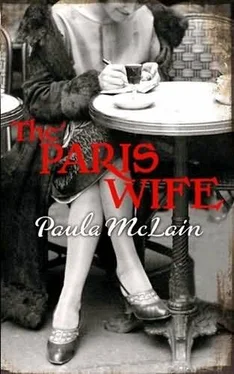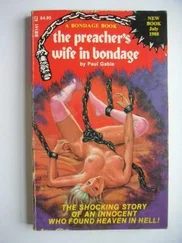“Look at you, wife,” he said when he met us on the platform. “You’re so fine and tan and lovely.”
I smiled and kissed him.
“And look at those woodchuck cheeks, Mr. Bumby,” he said. “I must say I have the most beautiful family. What great luck.”
All through dinner he was full of exciting stories about New York. It wasn’t until we were in bed that I told him about the concert at Salle Pleyel, and he was nearly as excited for me as I had been for myself.
“I’ve always wanted this for you, Tatie. To have music in your life just like you did back home. For it to matter that much.” He ran his hands through my hair, which was growing out wildly and had become quite blond with all the sunshine. “I didn’t know how much I missed you until I saw you today.”
“Didn’t you?”
“There’s something about coming home that reminds you of what you have.”
“I missed you the whole while.”
“That’s nice, too,” he said. “It’s all nice.”
I kissed him, and then lay down in the featherbed and watched him fall asleep. His eyes relaxed completely and showed no lines around them and no tiredness. He was like a boy when he slept well. I could see the child he used to be under the man, and I loved them both, simply and completely and irreversibly. I tucked myself beneath his arm, and felt his breath moving in and out, and let myself sleep.
In March, the avalanches came disastrously to Schruns. Herr Lent was leading a party of Germans when the first loss came. There’d been so much sun, conditions were dangerous, and although Lent had told the Germans not to come, they came anyway and insisted on skiing whether he led them or not. So he took them to the soundest slope he knew and crossed it himself, first, to be sure. They came across as a group, thirteen of them reaching the center of the slope just as the hillside came down in a crushing slide, burying all thirteen. By the time a rescue party arrived to dig them out, nine were dead.
When Lent and his pretty assistant Fräulein Glaser came to spend an evening with us at the Taube, we heard the whole thing firsthand.
“One man got caught in heavy snow, old snow, especially wet and deep,” Lent said. “We didn’t find him for two days. The rescuers dug and dug, and when he finally turned up it was his blood that had made an easy trail for us to follow. He’d nearly twisted his head off trying to find a way to breathe.”
“Right to the bone,” Fräulein Glaser added. She was so fresh and lovely with her tightly knotted hair and tanned brown face that it was almost a shock to hear such horrible details coming from her. “There was another man, years ago, killed in a powder-snow avalanche. He’d been turning to wave to his friend, and both of them died while waving, smiling.”
“I can’t believe the part about them smiling,” I said.
“I can,” Ernest said. The fire crackled and snapped and we all went quiet for a time. “Maybe it’s like bullfighting or anything else,” he finally said, staring into his cup of mulled wine. “Maybe you can learn the avalanche, versing yourself on the conditions and what sets them off and how to survive in one if you’re taken away.”
“Perhaps,” Lent said. “You might improve your chances, in any case, but it would never stop being dangerous.”
“Do you think we’ll get up again this season?” Ernest asked.
“Unlikely,” Lent said. “And if you could talk someone into taking you up the mountain, it wouldn’t be me. I couldn’t live with myself if something happened a second time.”
Fräulein Glaser nodded compassionately, but Ernest didn’t seem the least bit chastened by Lent’s experience. He was still thinking about how it might be done. I could tell by the spark in his eyes that any challenge set off. He wanted to test his skill and his fear, too, just as I was thinking, Men have died. We shouldn’t be here at all .
Because Lent remained adamant about our not skiing, we were happy to get a letter from Dos Passos, near the end of March, saying he was coming by for a visit with the Murphys. When they arrived, being at Schruns was like being anywhere with the very rich. It was an incomparable party at all hours of the day, and everyone was jolly.
“I love your little hideaway,” Sara Murphy said when she came to breakfast in new and absolutely pristine ski clothes even though the skiing was nil.
“It’s the best place around,” I agreed.
“But not hidden any longer,” Ernest said with a snide smile.
Ernest was often quick to complain about the Murphys’ unending good taste and loads of ready cash. He had more patience with Sara, because she was so beautiful and gave us all something nice to look at. Gerald was trickier. He was too polished for Ernest, too refined. His clothes were perfect and he spoke so well, one couldn’t help but feel he’d built himself from the ground up into a creature that was only elegance, only charm. But he also seemed strangely determined to do whatever it took to impress Ernest and gain his friendship and approval. We couldn’t reach the slopes, but Ernest gave Gerald skiing lessons on the hill behind the Taube, and it was here Gerald began to call Ernest “Papa” because he was the seasoned teacher and loved that role. He said, “Show me again how to cut that turn at the bottom of the slope, Papa. That was a beauty.”
Ernest remained wary. “They could buy the whole stinking Riviera if they chose,” he said in bed one night. “And they’d people it with lots of interesting specimens to entertain them at all hours, like us. We’re all monkeys for the organ grinder, and Dos is the worst. He hasn’t got any spleen left at all, he works so hard to keep them.”
“But some of it’s nice, and they’re very generous, aren’t they?”
“Here’s my good and true wife again. Would it kill you to agree with me once?”
“Would it kill you to see the good in them? They admire you to no end.”
“The very rich only admire themselves.”
We lay still for some moments and in the silence I could hear Bumby’s dry cough in the next room. The older he grew, the less often he woke in the night, and we didn’t bother employing Tiddy now except by day. But as I listened to the cough build, I thought that it might be nice to have her there, for moments like this one.
“Are you going to get that?” Ernest said. “You wouldn’t want him to wake our good and generous guests.”
“Do you have to be such a perfect ass?” I said, getting up tiredly and reaching for my robe.
“I do, yes. It keeps me in shape.” He rolled over and made a big show of getting comfortable for sleep while I went in to mind the baby, who wasn’t really even awake. He coughed with his eyes closed, still dreaming, and when the spell finally settled, he seemed perfectly well and breathed deeply. When I went back to bed, I crawled in quietly thinking Ernest would already be asleep, but he wasn’t.
“I’m sorry I’m such a crotchety shit,” he said in the dark. “You’ve always been the better guy.”
“I’m not,” I said and turned to face him. “We’re the same guy, aren’t we?”
“Sure,” he said, and he tousled my hair and kissed me on the nose. “Good night, Tatie.”
“Good night, Tatie,” I said back.
At Chenonceaux the château stood, reflected perfectly in the Cher River. It looked as if it was there because I’d imagined it, that it had come out of my dream and would hover until I turned away and it dissolved. My eyes were drawn over and over to the doubled string of arches until I couldn’t tell which was the real and which was the still mirror.
“It’s called the Ladies’ Castle,” Pauline said, reading from her guidebook.
Читать дальше












